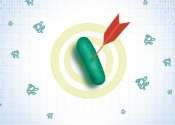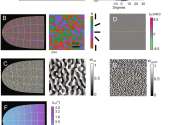Last update:
Biomedical technology news
Oncology & Cancer
New evidence casts doubt on a much-hyped blood test for early cancer detection
New evidence published by The BMJ today casts doubt on a much-hyped blood test for the NHS that promises to detect more than 50 types of cancer.
9 hours ago
0
21
Diabetes
Electric bandage holds promise for treating chronic wounds
Researchers have developed an inexpensive bandage that uses an electric field to promote healing in chronic wounds. In animal testing, wounds that were treated with these electric bandages healed 30% faster than wounds treated ...
14 hours ago
0
34
In probing brain-behavior nexus, big datasets are better
When designing machine learning models, researchers first train the models to recognize data patterns and then test their effectiveness. But if the datasets used to train and test aren't sufficiently large, models may appear ...
18 hours ago
0
36

How supercharged silk could help heal the heart
UNSW researchers have developed a new microgel made of moth silk that is designed to assist with tissue regeneration and could help people recover from heart attacks.
18 hours ago
0
3

Brain implants to restore sight face a fundamental problem—more pixels don't ensure better vision
Elon Musk recently pronounced that the next Neuralink project will be a "Blindsight" cortical implant to restore vision: "Resolution will be low at first, like early Nintendo graphics, but ultimately may exceed normal human ...
15 hours ago
0
0

Cutting-edge 3D-printed microneedle technology revolutionizes remote health care
In a significant leap forward for health care equity and accessibility, researchers at the University of Victoria and the Terasaki Institute for Biomedical Innovation (TIBI) have developed a revolutionary system that combines ...
17 hours ago
0
0

Collaborative autism study analyzes movement through computer vision technology
A collaborative research study, led by IU Columbus Associate Professor of Psychology Mark Jaime, is getting attention in the neuroscience field for its innovative study of physical movement and autistic traits.
17 hours ago
0
0

Dozing at the wheel? Not with these fatigue-detecting earbuds
Everyone gets sleepy at work from time to time, especially after a big lunch. But for people whose jobs involve driving or working with heavy machinery, drowsiness can be extremely dangerous—if not outright deadly.
Aug 6, 2024
0
18

New optical method measures blood plasma viscosity to assess COVID-19 severity
A research team led by MedUni Vienna has shown in a study that purely optical measurements of the viscosity of blood plasma may provide information about the severity and progression of COVID-19.
Aug 6, 2024
0
42

New alloy shown to produce better human joint implants
Stiffness, pain and infections in orthopedic surgery is being tackled by Flinders University researchers driving innovation in alloy materials to produce safe and superior implants compatible with human tissue.
Aug 6, 2024
0
1

AI-enabled device allows novices to accurately estimate gestational age
Novice users with no prior training in ultrasonography can accurately estimate gestational age (GA) with an artificial intelligence (AI)-enabled device for first-trimester pregnancies, according to a study published online ...
Aug 6, 2024
0
0

New system uses microfluidic technology for sperm selection
A City University of Hong Kong (CityUHK) research team led by Professor Michael Yang Mengsu, Senior Vice-President (Innovation and Enterprise), and Yeung Kin Man Chair Professor of Biomedical Sciences, collaborated with mainland ...
Aug 6, 2024
0
0

New biomaterial regrows damaged cartilage in joints
Northwestern University scientists have developed a new bioactive material that successfully regenerated high-quality cartilage in the knee joints of a large-animal model.
Aug 5, 2024
1
834

New PET/MRI probe promises early discovery of covert diseases
A research team from IOCB Prague, working in collaboration with the University of Tübingen, Germany, and the Faculty of Science, Charles University, has developed a new type of contrast agent that can be used in both magnetic ...
Aug 5, 2024
0
0

Wound healing checked in real time with electronic suture
A research team has successfully developed an electronic suture that can monitor changes in inflammation levels around wounds in real time. The electronic suture is expected to contribute significantly to wound care and personalized ...
Aug 5, 2024
0
0

New progress in wearable blood pressure monitoring enabled by flexible electronics and machine learning
Cardiovascular disease is the leading cause of death worldwide. Hypertension, as one of the predisposing factors of cardiovascular disease, is an important reason for the high incidence of cardiovascular disease. Actively ...
Aug 5, 2024
0
1

Researchers devise novel solution to preventing relapse after CAR T-cell therapy
Even as they have revolutionized the treatment of certain forms of cancer, CAR T-cell therapies have been shadowed by a significant limitation: Many patients, including those whose cancer goes into full remission, eventually ...
Aug 2, 2024
0
60

Early disease detection in body fluids using photonic biosensors
Standard medical procedures are often time-consuming and generally do not take into account the individual characteristics of patients. This can have a negative impact on the success of treatment and impair quality of life.
Aug 2, 2024
0
0

ChatGPT still not very good at diagnosing human ailments
A team of medical researchers at Western University's Schulich School of Medicine and Dentistry has found that despite being trained on terabytes of data, the LLM ChatGPT is still not good at diagnosing human ailments. In ...

New AI tool simplifies heart monitoring: Fewer leads, same accuracy
To diagnose heart conditions including heart attacks and heart rhythm disturbances, clinicians typically rely on 12-lead electrocardiograms (ECGs)—complex arrangements of electrodes and wires placed around the chest and ...
Aug 1, 2024
0
62

New insights into fruit fly cell regulation may offer clues for treating brain tumors
Peter Mac researchers have discovered new insights into neural stem cell development in fruit flies that may provide answers on how brain tumors grow in humans.
Aug 1, 2024
0
22

EVape helps improve consumer safety in the e-cigarette segment
Electronic cigarettes, or vapes, are commonly viewed as less harmful to people's health than tobacco cigarettes. And yet, they are not without health drawbacks. For many ingredients, it is unknown how they will behave when ...
Aug 1, 2024
0
0

Experimental AI method boosts doctors' ability to diagnose cancers and precancers of the esophagus
Artificial intelligence is being used in a wide variety of applications in medicine, and now scientists have developed an AI system that can boost detection rates for cancerous and precancerous lesions of the esophagus, which ...

AI predicts male infertility risk with blood test, no semen needed
According to a World Health Organization (WHO) study (2017), about half of all infertility is due to men. Semen analysis is considered essential for diagnosis of male infertility, but is not readily available at medical institutions ...
Jul 31, 2024
0
16

AI opens door to safe, effective new antibiotics to combat resistant bacteria
In a hopeful sign for demand for more safe, effective antibiotics for humans, researchers at The University of Texas at Austin have leveraged artificial intelligence to develop a new drug that already is showing promise in ...
Jul 31, 2024
0
110













































